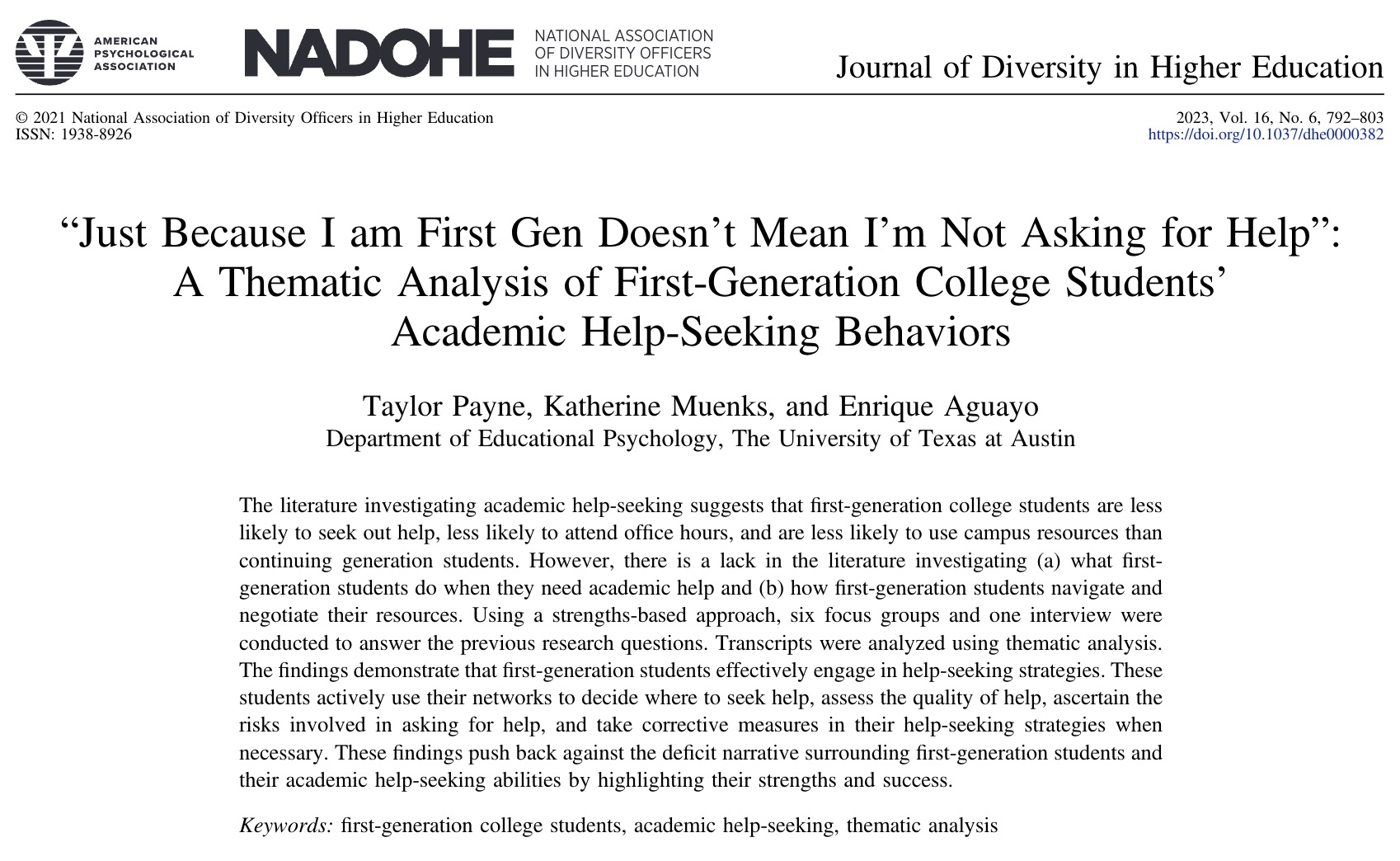February 2024 | Issue 7 | Volume 1 | Previous Issues
Greetings!
This month, in addition to reminders about upcoming professional development opportunities and events, we are spotlighting our colleagues in the Office of Diversity, Equity, Inclusion, and Social Justice (DEISJ). VTSU’s new Chief Diversity Officer, Dr. Oyibo Afoaku, began her work in January, and we are pleased to help introduce her to you, along with Aurora Hurd, the Assistant Director of the Office DEISJ, who has been working steadily to support students, staff, and faculty in their role.
Additionally, we are focusing on first-generation college students (FGCS). As you likely know, a significant number of VTSU students are the first in their families to attend college. You may not know that VTSU campuses offer robust services (many through federal TRIO grants) to support FGCS. Students who engage wiith Student Support Services, Lyndon Link, and McNair have access to mentoring, extra grants, study skills counseling and more. These federal grants typically cover five years and are renewed through a competitive process, which relies, in part, on achieving metrics around retention and graduation for student currently served. The staff who run these programs rely on referrals from faculty to build their rosters – please take a few moments to let your students know about these important programs!!
Finally, there is a call for volunteers and faculty partners to engage with the Vermont Student Anti-Racism Network.
Paid Professional Development Opportunities
Each of these opportunities (occurring in Spring and/or Summer 2024 provide a generous grant-funded stipend for faculty who participate in and complete the course or curriculum development work. Click on each header to expand for details.
These professional development experiences are meant to support you with work you have to do, as they are aligned with VTSU priorities, and acknowledge the time and effort you will spend by providing compensation. If you have questions about any of them, please reach out to the CTLI at ctli@vermontstate.edu.
DEI Outcomes in the Gen Ed
As you likely know, part of the phased-in Gen Ed requires diversity, equity, and inclusion (DEI) outcomes in the Gen Ed, starting in Fall 2024. With the endorsement of the Faculty Assembly Gen Ed committee, the CTLI is offering paid opportunities to support this work through the generous support of the Castleton Title III grant.
| Limited Funding Availability – Apply as Teams* of Instructors DEADLINE EXTENDED TO FEBRUARY 14 OR UNTIL ALL SLOTS ARE FILLED – APPLICATIONS WILL BE REVIEWED ON A ROLLING BASIS) |
|---|
| Participate in Teams any time February 1 to August 1, 2024 |
| Complete a 5-module Inclusive Teaching Class (12-24 hours) •Meet at least 5x times as a group to discuss what you’ve learned and how you can apply it to your VTSU teaching •Submit individual Verified Certificate for completing the 5 modules •Submit a group reflection Compensation: $750 per team member + $100 registration for class |
| Develop DEI Curriculum for Gen Ed Courses •Write, develop, revise, and practice (with peer feedback) course outcomes, assessments, and lesson plans. •Submit individual course plans •Submit a group reflection Compensation: $1000 per team member |
| *Teams of 2-5 instructors must apply and be accepted. •Each Team must have a person in the Team Lead role (additional support, responsibilities, and compensation). •First-round deadline = January 24 at 12noon. |
Please apply with a team of colleagues or apply as an individual (to be assigned to a team) to develop course-level outcomes, content, and learning experiences for your Gen Ed course(s). Selected teams will take an Inclusive Teaching course and then use what they’ve learned to plan their fall Gen Ed courses.
If you would like to join a team, but do not want to self-form a team, please use this form to indicate your interest, and the CTLI will facilitate the forming of teams from the individuals who sign up.
As of February 5, there is funding still funding for 8 people to participate (24 slots have been filled).
F2F+ Option 1: Course Development
The CTLI applied for a new round of funding for a project titled “Prioritizing Access Through ‘Face-to-Face Plus’ Expansion + OER Adoption,” and we were notified that our application was approved for $216,261, the bulk of which is allocated for faculty stipends. The grant was received from the Davis Educational Foundation established by Stanton and Elisabeth Davis after Mr. Davis’s retirement as chairman of Shaw’s Supermarkets, Inc.
| Limited Funding Availability – Apply as an Individual (due Feb 21) |
|---|
| Attend a full-day kick-off retreat on May 22. Compensation: $300 |
| Complete a 4-week ‘Intro to F2F+ Teaching’ course in June •4-6 hours per week of attendance and homework (synchronous, offered in the F2F+ modality) •Complete a F2F+ course redevelopment map •Complete at least 2 F2F+ class lesson plans (practice 1) •Work with a Mentor to plan, revise, and develop F2F+ teaching Compensation: $1250 |
| Summer & Fall Continuation Work •Complete 4 additional F2F+ lesson plans that address active learning & multimodal engagement in July •Practice with classroom technology •Work with a Mentor to plan, revise, and develop F2F+ teaching •Contribute to ”lessons learned” through focus group participation, surveys, or semi-structured interviews Compensation: $500 |
Please apply as an individual by 12noon on February 21 to convert a course to the F2F+ modality. Selected individuals will take a 4-week synchronous course in June 2024, during which they’ll map out the outcomes, assessments, and learning activities for a F2F+ course then design lesson plans for teaching in the F2F+ modality. Additional support will be provided for effective integration of technology. Faculty who have participated in this program in the past are eligible to apply, as long as you are converting a new class that you haven’t previously converted.
There are stipends to support 40 faculty between the two Davis Educational Foundation-funded opportunities for F2F+ classes.
F2F+ Option 2: OER Conversion
The CTLI applied for a new round of funding for a project titled “Prioritizing Access Through ‘Face-to-Face Plus’ Expansion + OER Adoption,” and we were notified that our application was approved for $216,261, the bulk of which is allocated for faculty stipends. The grant was received from the Davis Educational Foundation established by Stanton and Elisabeth Davis after Mr. Davis’s retirement as chairman of Shaw’s Supermarkets, Inc.
| Limited Funding Availability – Apply as an Individual (due Feb 21) |
|---|
| Attend an OER keynote and kick-off retreat in May or June (date TBD based on participant schedules). Compensation: $300 |
| Work with CTLI staff and Librarians to convert a F2F+ class to no- or low-cost course materials and textbooks in June •Research Open Educational Resources (OER) relevant to course and discipline •Determine if OER materials will be adopted, adapted, created, or a combination •Select and create OER materials, ensuring costs for students will remain under $50 •Create resources and activities to accompany OER materials Compensation: $1250 |
| Summer & Fall Continuation Work •Participate in a Focus Group with other faculty OER who’ve converted a class to OER •Have students complete a survey about their OER experience •Share what you’ve learned through presentations, case study write-up, lessons learned tips, etc. Compensation: $500 |
Please apply as an individual by 12noon on February 21 to convert an existing F2F+ course to no- or low-cost textbook/materials for students. With support of librarians and CTLI staff, you will explore existing Open Educational Resource (OER) materials to adapt or adopt; if no relevant materials exist, you will have the opportunity to create your own (or some combination of adoption, adaptation, and creation). Faculty who have adopted OER in the past have appreciated the ability to customize content to suit their outcomes, students, and interests. Students appreciate the emphasis on affordability.
There are stipends to support 40 faculty between the two Davis Educational Foundation-funded opportunities for F2F+ classes.
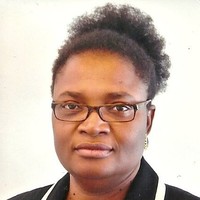
Campus Partner Spotlight – The Diversity Office
Chief Diversity Officer, Oyibo H. Afoaku, Ph.D.
We are excited to share the following introduction to Vermont State University’s new Chief Diversity Officer, Oyibo H. Afoaku, Ph.D., as well as a couple of initiatives she’d like to bring to the faculty’s attention.
Before accepting her position at VTSU, Dr. Oyibo served as Scholarships and Engagement Consultant for the Hudson and Holland Scholars Program at Indiana University, Bloomington. She also served as Professional Tasks Staff for the Residential Programs & Services and the inaugural Director of the Neal-Marshall Black Culture Center respectively at the same institution. Prior to her tenure at Indiana University, Bloomington, Dr. Oyibo served as the Assistant Director of the Marcus Garvey Culture Center at University of Northern Colorado, Greeley.
Dr. Oyibo is also the author of two books: African-born female professionals in American higher education; and Black Women and the Struggle Against Apartheid in South Africa.
Introduction
My name is Oyibo (pronounced, Oyeebo). I was born and raised in Nigeria, a country in West Africa. I came to the U.S. in 1986 to join my husband. English is my second language. I learned English during my elementary and secondary education. Nigeria was colonized by Britain and English is the official language of instruction. My first language is Igbo. I am also a first-generation college student. I hold the B.A. in U.S. & European history, and Washington State Initial Teaching Certificate (4-12 grades). I have an MA in African, Asian, & Latin American history (AAL), and the PhD in Educational Leadership. I have over 30 years of experience in American higher education. My multicultural background, education, and experience made DEISJ an excellent career choice for me.
As an undergraduate student back at Washington State University, Pullman, (1987-1990), I was a student volunteer in the Office of Multicultural Affairs. The director, Dr. Stephen Sneed, was an inclusive leader. Both domestic and international students and professionals felt included and a sense of belonging at WAZZU. Dr. Sneed’s inclusive leadership style, motivated me to seek a career in Diversity, Equity, Inclusion, and Social Justice (DEISJ). We assisted the office in a variety of ways including programming, outreach, office duties, etc. The Office became the “home away from home” for many of us. I had the opportunity to meet and interact with students, faculty, staff, friends from the local communities, the state and around the world.
Last year, I accepted the Chief Diversity Officer role at Vermont State University. During the many zoom meetings and my campus visit, I observed that everyone was very friendly and gave honest answers to my questions. I decided that I would appreciate an opportunity to join the VTSU family, and here I am. Thanks for the warm welcome you all have extended to me. We look forward to collaborating with everyone, because together, we can make a difference.
Campus Climate Survey
Please, participate in the Campus Climate Survey that will be out in early March. We need everyone’s input. We hope to use the data to understand where the university is right now with regards to how we feel about being a part of our institution, and where we should be going together. Thanks in advance. The DEISJ office is looking forward to collaborating with every office and department in a variety of ways to foster inclusive excellence by moving DEISJ initiatives forward.
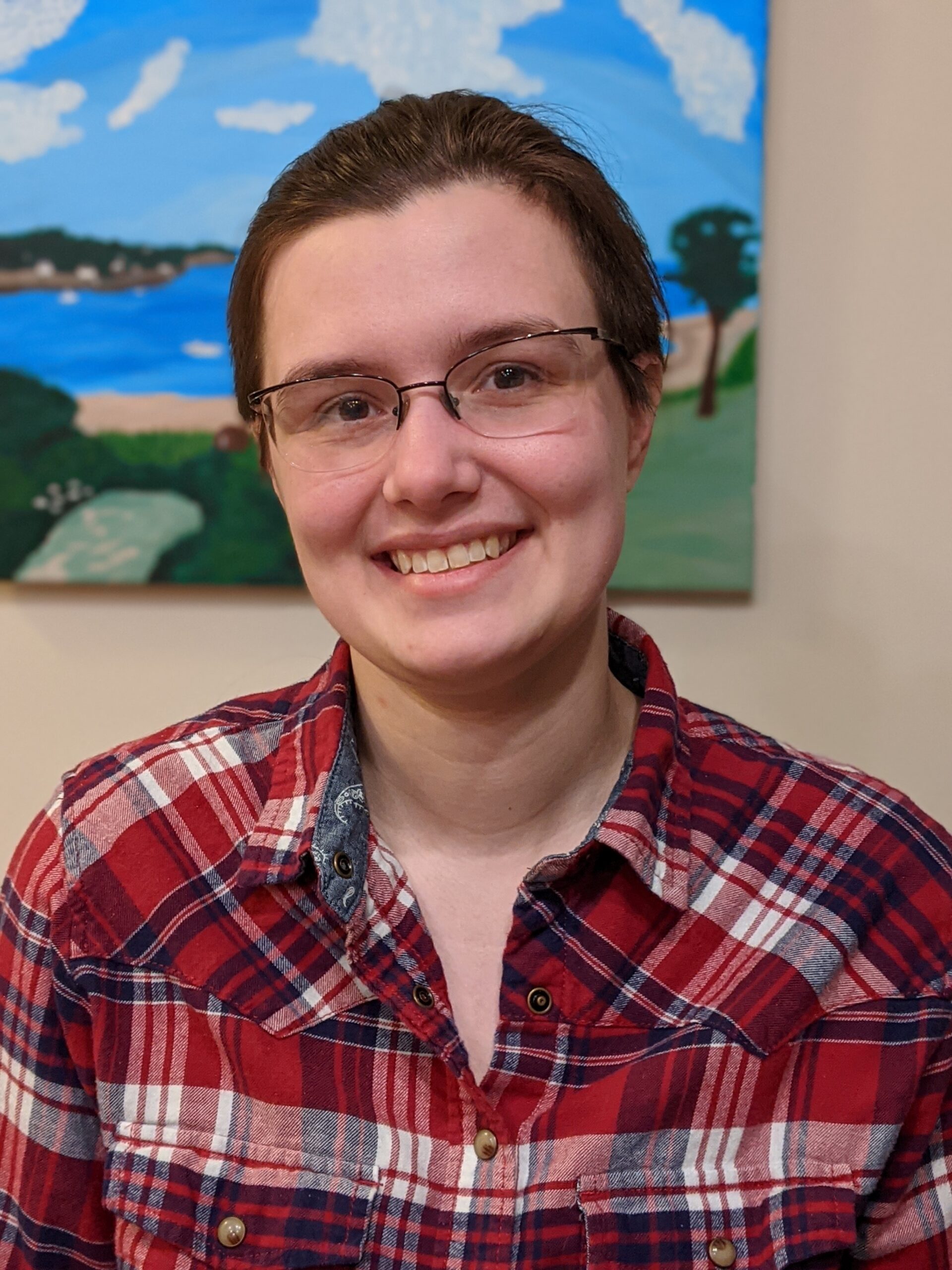
Assistant Director of DEISJ Outreach and Accountability, Aurora Hurd
In addition to Dr. Oyibo, the Center for Teaching & Learning Innovation also had the pleasure to speak with Assistant Director of DEISJ, Aurora Hurd, who is a major contributor in the Diversity Office and plays a leadership role as the facilitator of the university’s antiracist inquiry group.
Please tell us a little bit about your background and what brought you to VTSU.
I received my associate degree from the Community College of Vermont and flourished in that supportive and personalized learning environment. Even though I went on to earn my BA from UVM and my MFA from Goddard College, I continued to feel a strong connection to the VSCS. When I began working in Vermont higher education in 2018, after starting my career in political campaigns and nonprofits, I was on the lookout for ways to rejoin that community as a professional. I have been lucky enough now to have worked for CCV, the Chancellor’s Office, and VTSU, having settled here at Vermont State. I am passionate about affordable, inclusive, quality education that all Vermonters can access.
What factors influenced your desire to pursue a career in Diversity, Equity, Inclusion, and Social Justice?
DEISJ has been a core aspect of my time as a student and professional – I’ve always tried to integrate it into every role I have held. It felt natural to then pursue a position where I could focus on that work and help others make it a part of their practice. Many factors played a part in influencing my passion for DEISJ. Some of the first that come to mind is that I spent most of my childhood growing up in the North East Kingdom where where socioeconomic class disparities were especially visible. I live in Winooski, the most diverse city in Vermont where 11 languages are spoken in our school district. I am a queer, trans person who has navigated that identity personally, professionally, and politically. So it is personal, and it is professional, these things often can’t be separated when it comes to equity work. Because this work is personal to all of us, we just need to take a moment to look at ourselves, our families, and our communities.
As the facilitator of Vermont State’s antiracist inquiry group, is there anything you’d like to share with faculty about the group? Also, for interested faculty members, how can they join and when are the meetings held?
The group is really welcoming, for educators of all subjects and at all levels of personal and professional DEISJ knowledge. The conversations focus on giving us space to learn and grow into educators who integrate antiracist teaching practices into all we do. It also gives us a place to unpack complicated and hard topics – some on the international scale and others at our university level. Meetings are held once a month on the third Friday from 12:00 p.m. to 1:30 p.m. over Zoom. To join, email me or complete this form. I hope to see you there!
Spring 2024 Book Group
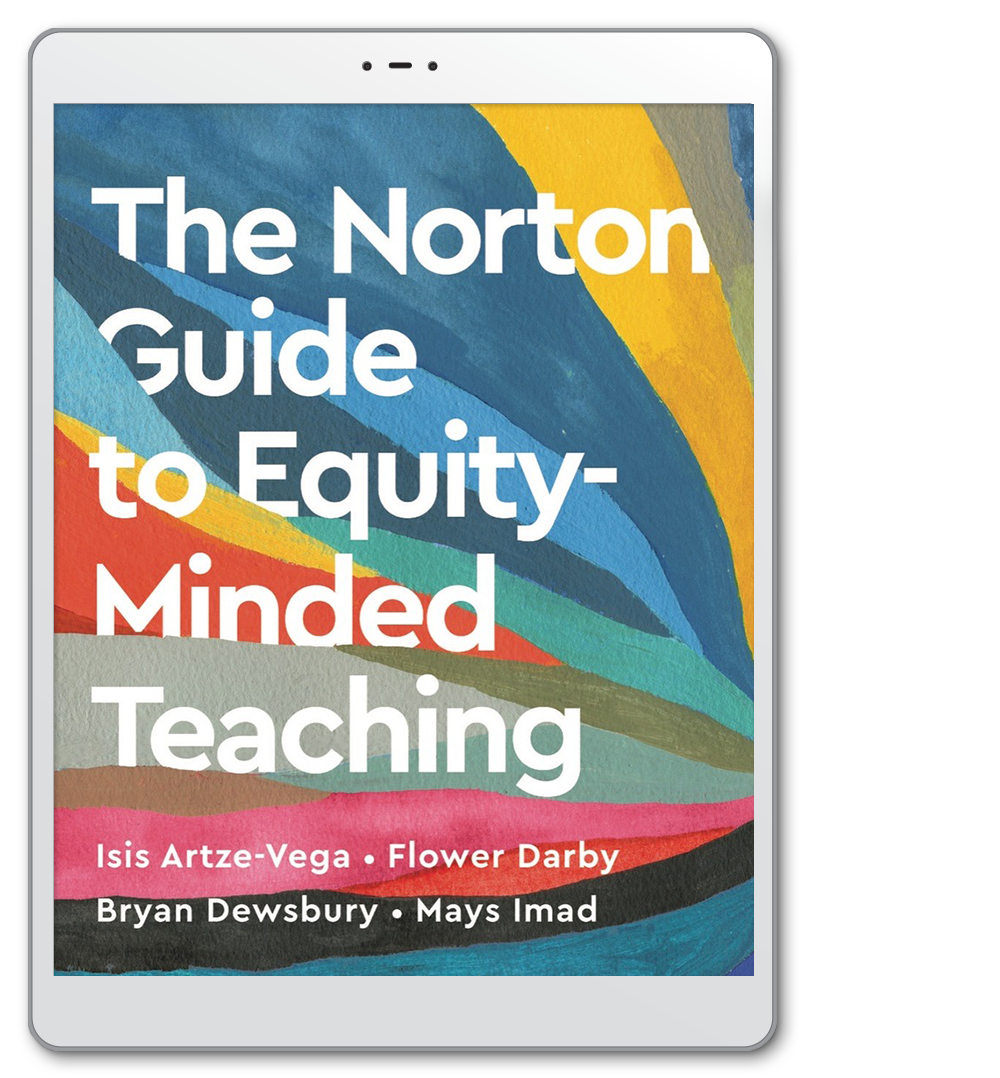
This month’s recommended reading is also our spring book group read! Join your colleagues reading and discussing The Norton Guide to Equity-Minded Teaching.
Written by renowned teaching and learning experts – Iris Artze-Vega, Flower Darby, Bryan Dewsbury, and Mays Imad – this guide offers concrete steps to help any instructor striving to ensure that all students – and, in particular, historically underserved students – have an equal chance for success. This practical resource includes actionable tips, grounded in research, for teaching college classes online, in person, and everywhere in between. Plus, the book is relevant to teaching in any discipline!
What does it mean to join the Book Group? We’ll be meeting four times during the semester for 90 minutes per session. Prior to each meeting, you’ll be reading sections of 30-50 pages and selecting a quote and/or idea from the guide that you’d like to discuss with the group.
The deadline for joining the spring group is Wednesday, February 14th, 2024, and interested educators can sign up by filling out this Book Group RSVP Form (you must login to your VSC account to complete the form).
Mark Your Calendar! Keynote Speaker Robin DeRosa

The CTLI is pleased to announce that on Friday, April 26 from 12:30-2:00pm, Robin DeRosa, will be delivering a keynote address for VTSU staff and faculty titled “Teaching Toward an Open Future.” This session will be on Zoom and recorded for anyone who cannot make it.
Session Description: Higher Education is in flux. Sometimes it feels like change is the only constant in our work lives as faculty and staff. There can be pressure to innovate, as well as anxiety about what might be lost if we radically transform our practices. We might even wonder if the values that motivate us as scholars, teachers, or support staff are reflected in our institutions, given how constrained they are by the ebb and flow of politics and markets. In this presentation, Robin will propose that we use Open Education as a bridge to help us cross from higher education’s current challenges into a more hopeful future where our colleges and universities are vehicles for the public good, powered by the people who work and learn within them. By aligning our values with our pedagogies and linking the university to the communities that surround and sustain it, we can imagine a way forward and design our daily work to bring us one step at a time toward the higher education that our students deserve.
While this session ties to our F2F+ OER efforts (read below), it should also be inspiring, uplifting, and empowering for any educator at VTSU.
Please register for this keynote to receive the Zoom link and calendar invitation.
Tips for Teaching First-Generation College Students
What exactly defines the term “first-generation student” varies somewhat. The definition used most frequently defines students as “first-generation” when neither parent has completed a four-year college degree (Davis, 2010). These students, research shows, struggle to succeed in college when compared to students whose parents attended college, so-called “continuing-generation students.” Sticking points include longer time to degree completion (Chen & Carroll, 2005), lower family incomes (Lohfink & Paulsen, 2005), and higher dropout rates among first-generation students (Engle & Tinto, 2008).
The following list comprises the most impactful recommendations for teaching first-generation college students. They are part of a guide developed by the Center for Teaching at Vanderbilt University and VTSU educators are encouraged to review it to gain a greater understanding of the challenges facing first-gen students.
Transparency
Although it may come with great individual freedom, college also comes with a number of unwritten rules, both cultural and academic. These rules may seem, after years in the academy or growing up in a family of college-educated people, completely commonsense. Yet, to first-generation students, they are anything but. To help students familiarize themselves with both the cultural and academic rules of college, instructors should be as transparent as possible about their expectations in every activity and assignment. In a pilot study of 1180 students, McNair, Finley, Winkelmes and colleagues (2016) found that greater instructor transparency increased students’ academic confidence, sense of belonging, and mastery of the skills that employers value in new employees. Gains were seen in all students as a result of increased transparency. The effect, however, was much more significant for first-generation and low-income students. To make assignments more transparent, instructors should ask themselves and then report to students their answers to the following three questions:
- Task: What do I want students to do?
- Purpose: Why am I asking students to do this?
- Criteria: How will I evaluate their work?
Ultimately, this transparency promotes equity in the classroom by allowing all students in on what Winkelmes calls the “secret, unwritten rules of college”(Berrett, 2015).
Teach Study Skills
The rigor of most college coursework requires the development of effective study skills. Instructors should not assume, especially in lower-level courses, that all students have the necessary study skills to succeed. Instead, instructors should be explicit in the classroom about how to best study for particular assignments and types of content (Hodges & White, 2001).
Organize Study Groups
Because first-generation students are more likely to isolate themselves academically and socially, they often miss out on the benefits of group study. To prevent this, instructors should organize formal study groups that incorporate all students. The level of supervision given to these groups may range. Instructors may choose to have a student who successfully passed the class previously or a graduate student participate in student study groups to provide information or record attendance. It may be suitable to include study group attendance and participation as part of a course participation grade. Particularly positive results have been observed when faculty show an active interest in such groups.
Use Rubrics
Grading rubrics make explicit the criteria by which complex assignments are evaluated. Using rubrics to assess student performance promotes equity in grading, expedites necessary communication with support services, and helps students pinpoint learning deficiencies to allow for more targeted improvement efforts (Stevens & Levi, 2005). Rubrics can also serve as formative assessments, which allow instructors track student progress and adapt learning activities to meet students’ content or skill deficits. Lastly, when given in advance of an assignment, rubrics assist students in focusing their efforts for an assignment (Stevens & Levi, 2005). This makes rubrics particularly useful for first-generation students.
Model Discussion
First-generation students may not be familiar with the procedures of discussion in academia. Instructors should take opportunities throughout the semester to model an ideal discussion. Indeed, because discussion may vary across disciplines making your expectations about in-class discussion transparent will be beneficial to all students. Along with modeling, instructors may take the opportunity to have a “meta-discussion” with students where, all together, students analyze a recent in-class discussion in order to reflect on speaking time, turn-taking, and evolving perspectives.
Incorporate First-Generation Experiences
Given the “invisibility” of first-generation status, these students often lack role models. Instructors must incorporate first-generation experiences into the curriculum in the same way that we attend to other forms of diversity. In disciplines where reading and discussion take up most of class time, texts by first-generation authors should be assigned, and discussions should, where possible, center the experiences of first-generation students. In all disciplines, instructors should be explicit about available accommodations or support services available to first-generation students.
The problem of educational retention and attrition among first-generation students persists even after these students receive their undergraduate degrees, which explains why first-generation students are less likely to enter doctoral programs than their peers (Choy, 2001; Hoffer et al., 2003). This, in turn, creates a pipeline issue for first-generation college faculty, given that terminal degrees are a pre-requisite for most faculty positions. In other words, first-generation college students have difficulty locating a first-generation role model on the faculty, which in turn makes it harder to recruit and train first-generation faculty. Whenever possible, then, professors who identify as first-generation students should make their first-generation status explicit.
Develop Personal Relationships
While beneficial to all students’ academic achievement and degree attainment, first-generation students in particular benefit from close interactions with faculty, both in- and outside of class (Filkins & Doyle, 2002; Smart & Umbach, 2007). Kim and Sax (2009) show that greater frequency of positive interaction between first-generation students and instructors translates into greater academic, social, and emotional gains. To achieve this, instructors might schedule one-on-one conferences with students, make office hours mandatory a certain number of times in a semester, or invite students to come early to class or stay behind to talk. If a class is too large to support these types of individualized interventions, an instructor may nonetheless promote closer relationships with students through personal surveys handed out to all students at the beginning of the semester or by sharing appropriate personal information about herself.
Interaction with faculty in a research context shows a particularly significant positive effect on college GPAs and degree aspiration for all groups (Kim & Sax, 2009). Therefore, faculty members should consider what opportunities may exist for collaborative research with undergraduates and which students take advantage of such opportunities. As Davis (2010) states, the “symbolic impact of being able to say, ‘I know Professor Smith,’ cannot be underestimated (197). Students will feel more integrated into campus life and more supported overall.
Build Cultural Capital
When Pappano writes that first-generation students “may not have grown up with the edifying vacations, museum excursions, daily doses of NPR and prep schools that groom Ivy applicants,” she is essentially referencing the amassed cultural capital of students from families with college-educated parents. Indeed, much of what is commonly considered to be hallmark of an educated person is instead the cultural capital accrued from being a member of a privileged class, race, gender, etc. (Gardner & Holley, 2011). For Doug Lederman (2013), it is this difference in cultural capital that divides first- and continuing-generation students. In their book Rethinking College Student Persistence (2013) Braxton and colleagues show that greater levels of cultural capital translates into greater engagement and social integration. In the classroom, then, instructors should avoid assuming that students will know certain culturally-specific information, such as the albums of The Beatles, or that they will have had culturally-specific experiences, such as travel abroad, because these represent a particular social (class, race, gender, etc.) position. Rather, instructors should look to include privileged cultural elements from a variety of communities and cultures. This disrupts the sheen of universality that accompanies elite Western culture. At the same time, instructors can help students gain cultural capital that will serve them in other classes and later in life. Lederman, for instance, cites a Wofford College program, Novel Experience, that pays for students, in small groups, to eat dinner at a fancy restaurant. Joined by a professor, the students discuss a previously assigned novel while getting to know the professor, their classmates, and the ins and outs of fine dining.
Citation: Galina, B. (2016). Teaching First-Generation College Students. Vanderbilt University Center for Teaching. Retrieved January 23, 2024 from https://cft.vanderbilt.edu/guides-sub-pages/teaching-first-generation-college-students/.
Recommended Literature
We’d like to bring your attention to the findings from a recent peer-reviewed article focused on first-generation college students.
Taylor Payne, Katherine Muenks, and Enrique Aguayo, in their 2021 article titled “Just Because I am First Gen Doesn’t Mean I’m Not Asking for Help”: A Thematic Analysis of First-Generation College Students’ Academic Help-Seeking Behaviors emphasize an asset-based approach to understanding and working with first-generation college students (FGCS). The researchers engaged 17 undergraduate, first-generation, and primarily BIPOC students in focus groups and one interview. The data then underwent a thematic coding process during which four major themes emerged: (1) Decision-making and navigating resources, (2) Peers’ influence, (3) Role of identity in learning environments, and (4) Professor perceptions.
You may have heard descriptions of FGCS that would be characterized as deficit-based. For instance, you may have learned about research showing that FGCS have low self-esteem or are reluctant to seek help or are unlikely to participate in class. In fact, the authors state, “the majority of research on first-generation students tends to overemphasize deficient student characteristics” (p. 792). This overemphasis masks important nuances. For instance, in this study, the authors found that FGCS are good at seeking help, but where they seek help and from whom differs from the norms and expectations of higher education. In this study, FGCS had strengths in self-help skills (using internet-based resources) and building peer social networks from whom they sought help. This information is pertinent to faculty who can curate self-help resources in Canvas, utilize active learning strategies that include peer interaction, and develop group-based project-based learning activities. Additionally student success staff can facilitate peer connections through identity-based affinity spaces. Related to help-seeking in the classroom, the FGCS participants found themselves particularly aware of their first-generation identity in the classroom (versus other places on campus), especially when they did not feel a sense of belonging. When students felt they were part of a classroom community, they were more willing to ask questions and make potential mistakes in front of their peers.
Past research has shown that FGCS access faculty office hours (or “student hours”) at lower rates than their continuing-generation peers. This study illuminates that a primary reason for this disparity is whether the FGCS perceives the instructor as approachable and capable of giving useful help. For instance, participants in the study explained that when they asked their professor a question, they felt the answer was circuitous and tangential. The authors point out that qualities of perception are hard to measure in a study. They are subjective, and students will have different perceptions based on their prior experiences and individual senses of connection with each instructor. However, there are some things that faculty can do to increase approachability such as expressing ideas in simple language (not assuming students are experts), offering support for career planning, and policies and actions that express caring (responsiveness, flexibility).
We recommend reading this article in full, as the quotes from the students are illuminating and the authors frame a shifted mental model of FGCS from a deficit-based to asset-based perspective in useful and compelling ways.
Student Volunteers Needed – Social Justice Reading Project in Local Schools
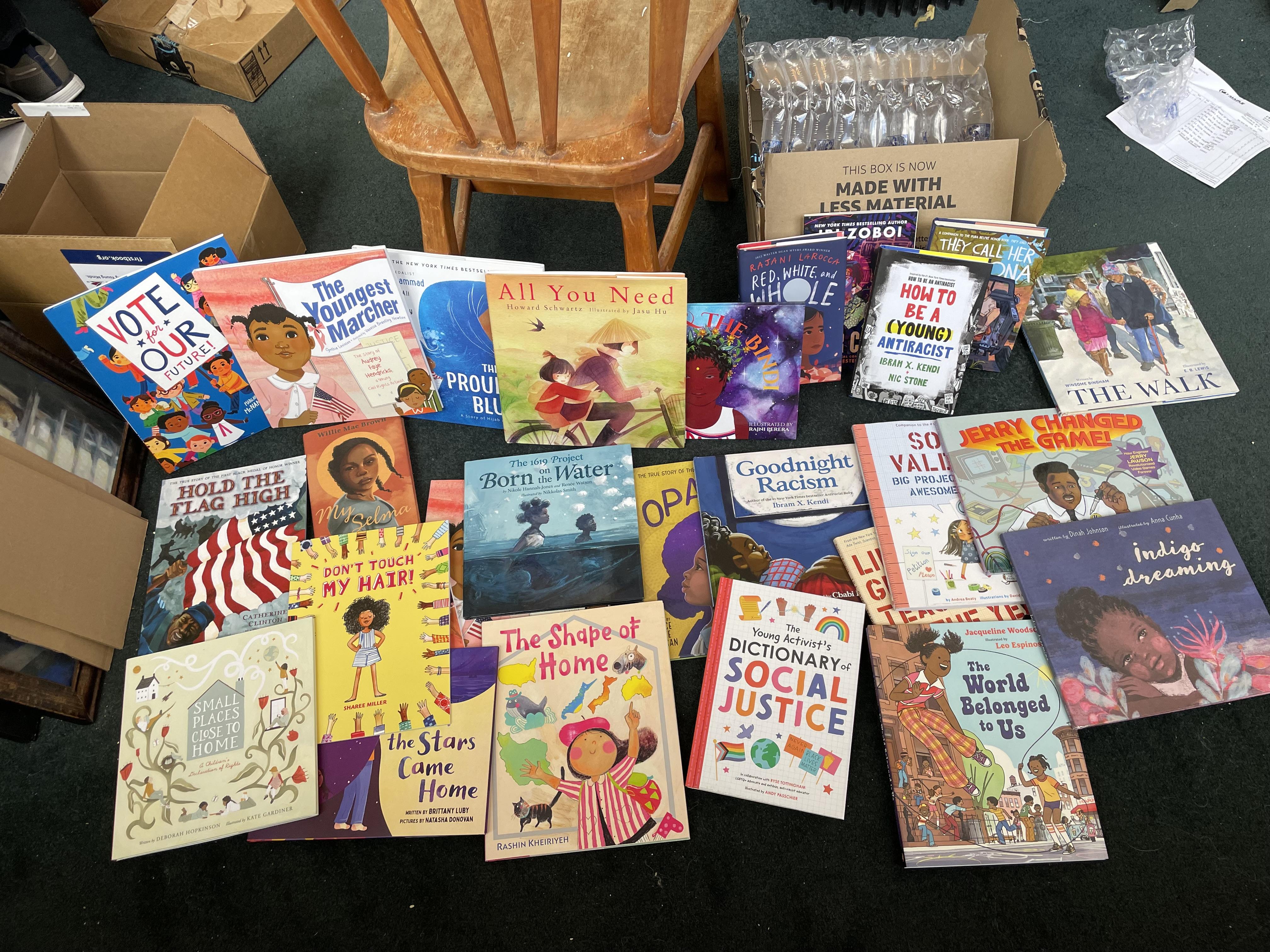
The Vermont Student Anti-Racism Network (VSARN) is looking for college students to volunteer (or receive a $25 stipend) to read books with social justice themes to local K12 school classes and to teach related lessons.
VSARN volunteers travel to schools across Vermont (both virtually and in person) with the goals of fostering kindness and inclusivity from a young age for elementary school students and to bringing discussions of racism into older classrooms.
Students who are interested in volunteering (or receiving a small stipend) can fill out this form (which also allows them to indicate interest in attending a gathering of VSARN college students at Champlain College).
VSARN is also interested in partnering with faculty who might be interested in building this kind of anti-racism outreach activity into their classes as a service-learning project. Faculty who are interested in exploring this opportunity can contact Addie at addie@vsarn.org.
